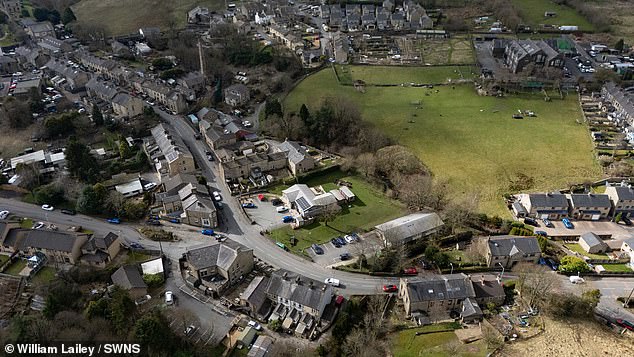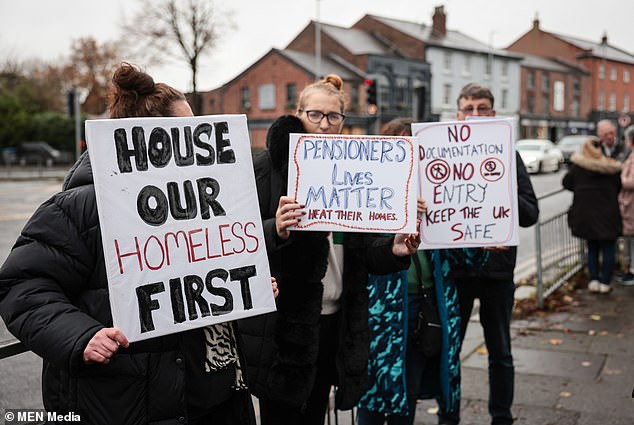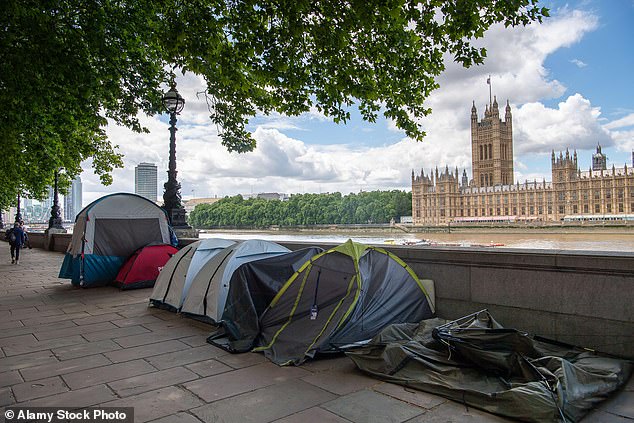Seventeen councils are accommodating up to 10 times more asylum seekers than homeless people, analysis suggests.
The biggest disparity was seemingly in Pendle, a borough inside Reform’s newly-gained Lancashire authority.
Latest Government data shows 453 asylum seekers are being housed in Pendle. In contrast, only nine homeless households are in temporary accommodation.
Critics of Britain’s immigration policy have seized upon the figures as proof we are ran by people who ‘care more about illegal migrants than its own citizens’.
However, officials criticised MailOnline’s ‘misleading’ analysis and argued that they could not control where homeless people choose to live.
The full results of our investigation can be viewed in our interactive map, which lays bare the true situation in every council.
Home Office data shows 89,000 asylum seekers – the equivalent of a town the size of Stevenage, Hastings or Southport – were being housed across England as of the end of March.
By comparison, 128,000 homeless ‘households’ were in temporary accommodation heading into 2025.

Aerial views of the village of Trawden, in Pendle, which is the local authority which has the biggest disparity in housing asylum seekers compared to homeless people
The Ministry of Housing, Communities and Local Government, which keeps track of the number of homeless ‘households’, says their overall estimate equates to around 295,000 people.
Because it does not list specific figures for each council, the only way of comparing the two is by posting homeless households against the number of asylum seekers.
Ten councils did not publish figures on homeless households, meaning they were excluded from our analysis.
In total, more than a third of England’s councils currently house asylum seekers at double the rate of homeless households.
Behind Pendle came Stockton-on-Tees (797 asylum seekers vs 26 homeless households) and Wyre (375 asylum seekers vs 14 homeless households).
Robert Bates, of the Centre for Migration Control thinktank, said: ‘Those who were born here and have contributed to the economy have been abandoned, and left on the streets, in favour of undocumented young men towards whom we should have no moral or legal obligation.
‘Thousands of British veterans and families are facing real hardship but are denied even a fraction of the generosity extended to asylum seekers.
‘Scattering these people across the country places further strain on communities suffering with a dysfunctional housing market, increasing rents and making it harder for young people to own a home.

A worried group gather in Manchester in November 2024 with a sign to ‘House Our Homeless FIrst’ in protest against asylum seekers being housed locally
‘Anyone entering the country illegally should be detained and swiftly deported – it is only then that we can hope this madness will end.’
While an asylum seeker is waiting to hear the outcome of their claim, the Home Office is legally obligated to provide them housing if they need it.
If they are successful they become recognised as refugees – entitled to work and receive full state benefits.
From that point on, councils have statutory responsibility to look after housing, if the refugees are unable to.
But councils do not provide accommodation to everyone and instead use a priority system, which takes into account children and other vulnerability factors, to decide who gets a home.
It means that some refugees may also fall under the homeless category in official statistics.
Fuelled by an explosion in small boat crossings, the cost of accommodating asylum seekers has tripled to £4.2million a day.
Around 30,000 are currently kept in hotels, where they are usually provided meals along with £8.86 per week. The Chancellor Rachel Reeves promised last week to end the housing of asylum seekers in hotels over the next four years.
The handout amount rises to £49.18 per week if no meals are provided. Extra money is also provided to pregnant mothers and young children.

Pictured: New arrivals are happy to be in buses at Dover after crossing the Channel in May
As well as getting free accommodation, asylum seekers are also entitled to taxpayer-funded NHS healthcare, prescriptions, dental care and children under 18 are required to go to school, where they may be able to get free meals.
Homeless people in temporary accommodation are offered full state benefits such as Universal Credit, and some hostels provide food that is paid through a service charge.
Those living in temporary accommodation make up the vast majority of homeless people, with only around 3,900 sleeping rough on any given night, according to the charity Shelter.
Critics claim that many homeless people have paid council tax and contributed for years to British tax and society, unlike asylum seekers.
Around four in five of those assessed as needing homeless relief of some kind were British nationals, according to the latest data.
Some of those left out in the cold are even veterans and ex-service personnel who have fought for the country in Iraq and Afghanistan.
Concerns have been raised that they may have to make do with a concrete pillow in a shop doorway, while they look up to see asylum seekers getting a cosy hotel bed on the same street.
Life on the streets is often dangerous, with rates of drinking and drug abuse high, leading to high rates of poor mental health and death compared to those who have a bed.
Alp Mehmet, of Migration Watch UK, said: ‘Over 100,000 people applied for asylum in 2024, including main applicants and their dependants. There will be just as many seeking asylum this year.
‘If they’re not in hotels, they will have to be housed elsewhere.
‘Then there’s the 430,000 net migration added to the population last year.
‘Well over half a half a million people needing a roof over their heads, roofs that won’t be available to British citizens.
‘When will the Government see sense and end this madness? Get a grip, Sir Keir!’
The public has been expressing their discontentment with the apparent unfairness of the situation for some time.
A recent survey by IPSOS found 68 per cent of the public deem the numbers coming to the UK to seek refugee status or asylum too high.
And in March when MailOnline visited Coventry, the local authority with the fifth-highest number of supported asylum seekers in Britain, locals expressed their frustration with the process.

Critics claim that many homeless people have paid council tax and contributed for years to British tax and society, unlike asylum seekers (stock image)
Louse and Dee said they were living in temporary accommodation and claimed the increasing numbers of asylum seekers in the area was making the housing shortage worse.
Louise, 37, said: ‘I’m currently homeless. The houses go to the asylum seekers rather than the actual homeless.
‘I’m in a shared accommodation and I am technically homeless.
‘I think the Government should be looking after their own before helping other people.
‘I don’t think the city can handle the amount of people coming in.’
Dee, 38, said she had to live separately from her husband just to find a bed to sleep in and blasted the Government.
‘I think it’s ridiculous that asylum seekers can come over here and get housed but my husband, who has paid taxes his whole life, is on the street.
‘I’m homeless too, we’ve had to separate so that one of us can get somewhere to sleep.
‘I don’t think we can handle the numbers, we can’t house the people who are from this city.
‘If they come over here and work and pay into the system, fair play to them. I know diverse people who I call my family. But the fact is, we need to help our own.’
In Manchester in November 2024, protesters against asylum seekers being housed locally held up signs which said ‘House Our Homeless First’.
There have been some recent cases of local authorities block-booking entire hotels for homeless people, in the same way the Home Office does for asylum seekers.
Last year Milton Keynes council signed a deal to use all 140 rooms of Harben House Hotel for five years, which it will use to house homeless people.
A report in August revealed that the council was spending around £20m a year on temporary accommodation mainly in the private rented sector and it needed to find lower cost spaces.
In the battle for scarce accommodation, councils have lost out on renting hotels due to Home Office contractors seeking space for asylum seekers outbidding them.
Furthermore, many asylum seekers become homeless once they are granted refugee status and have to find their own accommodation.

Pictured: An inflatable dinghy carrying migrants makes its way towards England
They are given 56 days to move on from asylum accommodation following the issue of their decision, which was extended from 28 days in December, but some campaigners complain it is still not enough time.
The No Accommodation Network (Naccom), an umbrella organisation for 140 frontline groups working with asylum seekers, refugees and other migrants across the UK, said homelessness among refugees has doubled in the last year.
In data shared with the Guardian in November, it said 1,941 refugees had now found themselves without accommodation – the highest number they had ever dealt with.
A Government spokesperson said: ‘This analysis is incorrect and misleading as it compares the number of individual asylum seekers with homeless households, which can contain more than one person.
‘We’ve taken immediate action to fix the broken asylum system this Government inherited, by increasing asylum decision making by 52 per cent and removing 30,000 people with no right to be here. We have already made asylum savings of half a billion.
‘We are also taking urgent and decisive action to end homelessness, fix the foundations of local Government and drive forward our Plan for Change by providing £1bn for crucial homelessness services this year so councils can support families faster.’
Sources said some areas have low levels of homelessness, which is why the number of asylum seekers placed in that area can look high in comparison.











